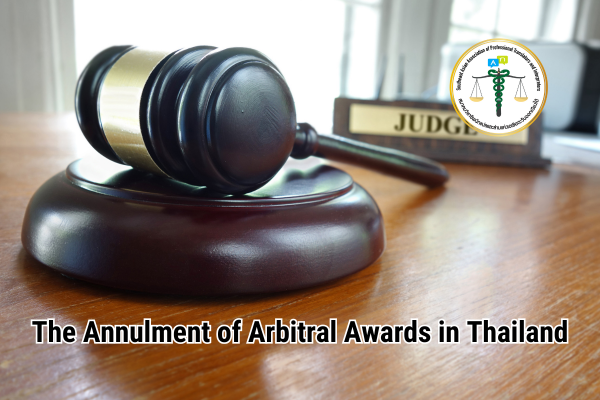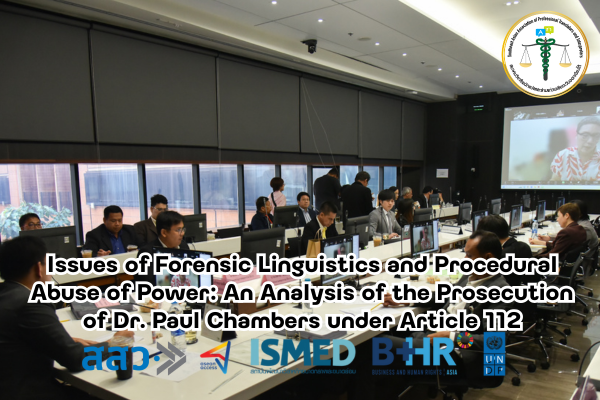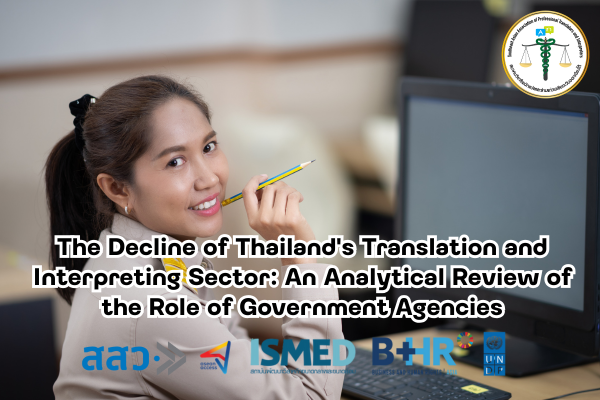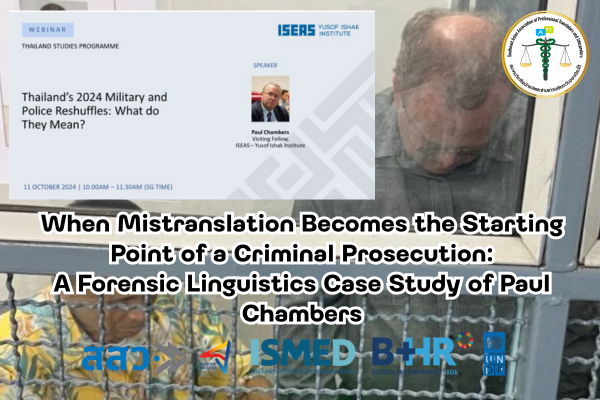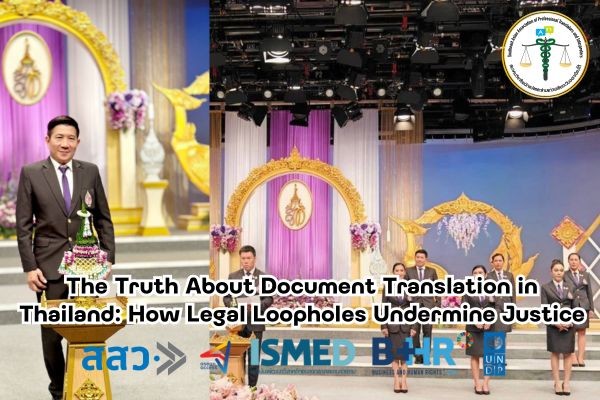The Annulment of Arbitral Awards in Thailand
23 February 2025, Bangkok – In Thailand, resolving disputes through arbitration has gained increasing popularity due to its speed and flexibility compared to litigation in courts. However, arbitral awards are not beyond challenge, particularly domestic awards, which fall under the Arbitration Act B.E. 2545 (2002).
The Authority of Thai Courts to Annul Arbitral Awards
Under the Arbitration Act B.E. 2545 (2002), Thai courts have the authority to consider requests to annul arbitral awards rendered in Thailand or under Thai law (domestic awards). The grounds on which a court may annul an award include:
- Capacity of the Parties – One of the parties to the arbitration agreement lacks legal capacity under the law applicable to that party.
- Binding Effect of the Agreement – The arbitration agreement is not binding under the law chosen by the parties, or, in the absence of such a choice, under Thai law.
- Notification and Opportunity to Present the Case – The party requesting annulment was not properly or timely notified of the appointment of the arbitral tribunal or the arbitration proceedings, or was unable to present its case in the arbitration.
- Scope of the Dispute – The award deals with a dispute outside the scope of the arbitration agreement or contains decisions on matters beyond the scope of the arbitration agreement.
- Composition and Procedure – The composition of the arbitral tribunal or the arbitration procedure was not in accordance with the agreement of the parties or, in the absence of such agreement, with applicable law.
- Status of the Award – The arbitral award is not yet binding or has been annulled or suspended by a competent court or under the law of the country where it was issued.
- Non-Arbitrable Disputes – The award relates to a dispute that cannot be settled by arbitration under the law.
- Public Order and Morality – The recognition or enforcement of the award would be contrary to public order or good morals of the people.
A party seeking to have an award annulled must file a request with a competent court, such as the Central Intellectual Property and International Trade Court, within 90 days of receiving a copy of the award.
Limitations Regarding Foreign Awards
In contrast, Thai courts lack jurisdiction to annul arbitral awards issued outside Thailand (foreign awards). This principle has been clearly affirmed by Supreme Court rulings, such as Judgment No. 8539/2560. Thai courts are limited to recognizing or refusing enforcement of foreign awards under the framework of the New York Convention, to which Thailand is a signatory.
Statistical Data
Although there have been instances where arbitral awards have been annulled by Thai courts, the exact number of annulled awards remains unclear in publicly available data as of February 23, 2025. Comprehensive statistics are not widely published in general sources, and obtaining precise figures may require access to paid legal databases or annual reports from institutions such as the Thailand Arbitration Institute (TAI).
Conclusion
The annulment of arbitral awards in Thailand serves as a mechanism to balance the authority of arbitration with judicial oversight. With a range of grounds—from the capacity of the parties to violations of public order—this process reflects an effort to uphold justice. However, comprehensive quantitative data remains scarce. Those seeking further details may need to consult specialized sources to gain a deeper understanding of trends and practical implications.
SEAProTI’s certified translators, translation certification providers, and certified interpreters:
The Southeast Asian Association of Professional Translators and Interpreters (SEAProTI) has officially announced the criteria and qualifications for individuals to register as “Certified Translators,” “Translation Certification Providers,” and “Certified Interpreters” under the association’s regulations. These guidelines are detailed in Sections 9 and 10 of the Royal Thai Government Gazette, issued by the Secretariat of the Cabinet under the Office of the Prime Minister of the Kingdom of Thailand, dated July 25, 2024, Volume 141, Part 66 Ng, Page 100.
To read the full publication, visit: the Royal Thai Government Gazette
การเพิกถอนคำชี้ขาดของอนุญาโตตุลาการในประเทศไทย
23 กุมภาพันธ์ 2568, กรุงเทพมหานคร – ในประเทศไทย การระงับข้อพิพาทผ่านอนุญาโตตุลาการได้รับความนิยมเพิ่มขึ้นเรื่อย ๆ เนื่องจากความรวดเร็วและความยืดหยุ่นเมื่อเทียบกับการดำเนินคดีในศาล อย่างไรก็ตาม คำชี้ขาดของอนุญาโตตุลาการไม่ใช่สิ่งที่ไม่อาจโต้แย้งได้ โดยเฉพาะอย่างยิ่งในกรณีของคำชี้ขาดภายในประเทศ ซึ่งอยู่ภายใต้บังคับของพระราชบัญญัติอนุญาโตtulาการ พ.ศ. 2545
อำนาจของศาลไทยในการเพิกถอนคำชี้ขาด
ตามพระราชบัญญัติอนุญาโตตุลาการ พ.ศ. 2545 ศาลไทยมีอำนาจในการพิจารณาคำขอให้เพิกถอนคำชี้ขาดของอนุญาโตตุลาการที่เกิดขึ้นในประเทศไทยหรือภายใต้กฎหมายไทย (คำชี้ขาดภายในประเทศ) เหตุผลที่ศาลสามารถใช้ในการเพิกถอนคำชี้ขาดมีดังนี้:
- ความสามารถของคู่สัญญา – คู่สัญญาฝ่ายใดฝ่ายหนึ่งในข้อตกลงอนุญาโตตุลาการไม่มีความสามารถตามกฎหมายที่ใช้บังคับกับคู่สัญญานั้น
- ผลผูกพันของข้อตกลง – ข้อตกลงอนุญาโตตุลาการไม่มีผลผูกพันตามกฎหมายของประเทศที่คู่สัญญาตกลงกัน หรือหากไม่มีการระบุไว้ ให้เป็นไปตามกฎหมายของประเทศไทย
- การแจ้งล่วงหน้าและโอกาสในการนำเสนอคดี – ฝ่ายที่ยื่นคำร้องไม่ได้รับแจ้งล่วงหน้าอย่างเหมาะสมและทันท่วงทีเกี่ยวกับการแต่งตั้งคณะอนุญาโตตุลาการหรือกระบวนพิจารณาของอนุญาโตตุลาการ หรือไม่สามารถนำเสนอคดีของตนในการพิจารณาอนุญาโตตุลาการได้
- ขอบเขตของข้อพิพาท – คำชี้ขาดเกี่ยวข้องกับข้อพิพาทที่อยู่นอกเหนือขอบเขตของข้อตกลงอนุญาโตตุลาการ หรือมีคำวินิจฉัยในประเด็นที่เกินขอบเขตของข้อตกลงอนุญาโตตุลาการ
- องค์ประกอบและกระบวนการ – องค์ประกอบของคณะอนุญาโตตุลาการหรือกระบวนการพิจารณาของอนุญาโตตุลาการไม่เป็นไปตามที่คู่สัญญาตกลงกัน หรือไม่เป็นไปตามข้อตกลงของคู่สัญญา
- สถานะของคำชี้ขาด – คำชี้ขาดของอนุญาโตตุลาการยังไม่มีผลผูกพัน หรือถูกเพิกถอนหรือระงับโดยศาลที่มีอำนาจ หรือภายใต้กฎหมายของประเทศที่ออกคำชี้ขาดนั้น
- ข้อพิพาทที่ไม่สามารถระงับได้ – คำชี้ขาดเกี่ยวข้องกับข้อพิพาทที่ไม่สามารถระงับข้อพิพาทโดยอนุญาโตตุลาการได้ตามกฎหมาย
- ความสงบเรียบร้อยและศีลธรรมอันดี – การรับรองหรือการบังคับใช้คำชี้ขาดจะขัดต่อความสงบเรียบร้อยหรือศีลธรรมอันดีของประชาชน
คู่พิพาทที่ต้องการให้ศาลเพิกถอนคำชี้ขาดต้องยื่นคำร้องต่อศาลที่มีอำนาจ เช่น ศาลทรัพย์สินทางปัญญาและการค้าระหว่างประเทศกลาง ภายใน 90 วันนับจากวันที่ได้รับสำเนาคำชี้ขาด
ข้อจำกัดในคำชี้ขาดต่างประเทศ
ในทางกลับกัน ศาลไทยไม่มีอำนาจในการเพิกถอนคำชี้ขาดของอนุญาโตตุลาการที่เกิดขึ้นนอกประเทศไทย (คำชี้ขาดต่างประเทศ) คำวินิจฉัยของศาลฎีกา เช่น คำพิพากษาที่ 8539/2560 ได้ยืนยันหลักการนี้อย่างชัดเจน ศาลไทยสามารถมีบทบาทเพียงการรับรองหรือปฏิเสธการบังคับตามคำชี้ขาดต่างประเทศภายใต้กรอบของอนุสัญญานิวยอร์ก ซึ่งประเทศไทยเป็นภาคีสมาชิก
ข้อมูลเชิงสถิติ
ถึงแม้ว่าจะมีกรณีที่คำชี้ขาดของอนุญาโตตุลาการถูกเพิกถอนโดยศาลไทยเกิดขึ้นจริง แต่จำนวนที่แน่นอนของคำชี้ขาดที่ถูกเพิกถอนนั้นยังคงไม่ปรากฏในข้อมูลสาธารณะอย่างชัดเจนจนถึงวันที่ 23 กุมภาพันธ์ 2568 ไม่มีสถิติที่ครบถ้วนเผยแพร่ในแหล่งข้อมูลทั่วไป และการเข้าถึงตัวเลขที่แม่นยำอาจจำเป็นต้องพึ่งพาฐานข้อมูลทางกฎหมายที่มีค่าใช้จ่าย หรือรายงานประจำปีจากหน่วยงานอย่างสถาบันอนุญาโตตุลาการแห่งประเทศไทย (TAI)
บทสรุปส่งท้าย
การเพิกถอนคำชี้ขาดของอนุญาโตตุลาการในประเทศไทยเป็นกลไกที่ช่วยรักษาความสมดุลระหว่างอำนาจของอนุญาโตตุลาการและการกำกับดูแลของศาล ด้วยเหตุผลที่หลากหลายตั้งแต่ความสามารถของคู่สัญญาไปจนถึงการขัดต่อศีลธรรมอันดี กลไกนี้สะท้อนถึงความพยายามในการรักษาความยุติธรรม อย่างไรก็ตาม ข้อมูลเชิงปริมาณที่ครอบคลุมยังคงขาดแคลน ผู้ที่สนใจในรายละเอียดเพิ่มเติมอาจต้องค้นคว้าจากแหล่งข้อมูลเฉพาะทางต่อไป เพื่อให้เข้าใจถึงแนวโน้มและผลกระทบในทางปฏิบัติอย่างลึกซึ้งยิ่งขึ้น
*** พระราชบัญญัติอนุญาโตตุลาการ พ.ศ. ๒๕๔๕
*** ARBITRATION ACT, B.E. 2545 (2002) (คำแปลโดยสำนักงานคณะกรรมการกฤษฎีกา)
*** ARBITRATION ACT, B.E. 2545 (2002) (คำแปลโดยสถาบันอนุญาโตตุลาการ)
*** พระราชบัญญัติอนุญาโตตุลาการ (ฉบับที่ ๒) พ.ศ. ๒๕๖๒
เกี่ยวกับนักแปลรับรอง ผู้รับรองการแปล และล่ามรับรองของสมาคมวิชาชีพนักแปลและล่ามแห่งเอเชียตะวันออกเฉียงใต้
สมาคมวิชาชีพนักแปลและล่ามแห่งเอเชียตะวันออกเฉียงใต้ (SEAProTI) ได้ประกาศหลักเกณฑ์และคุณสมบัติผู้ที่ขึ้นทะเบียนเป็น “นักแปลรับรอง (Certified Translators) และผู้รับรองการแปล (Translation Certification Providers) และล่ามรับรอง (Certified Interpreters)” ของสมาคม หมวดที่ 9 และหมวดที่ 10 ในราชกิจจานุเบกษา ของสำนักเลขาธิการคณะรัฐมนตรี ในสำนักนายกรัฐมนตรี แห่งราชอาณาจักรไทย ลงวันที่ 25 ก.ค. 2567 เล่มที่ 141 ตอนที่ 66 ง หน้า 100 อ่านฉบับเต็มได้ที่: นักแปลรับรอง ผู้รับรองการแปล และล่ามรับรอง


